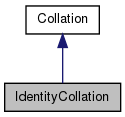Collation class that's essentially a no-op. More...


Public Member Functions | |
| getFirstLetter ($string) | |
| Given a string, return the logical "first letter" to be used for grouping on category pages and so on. | |
| getSortKey ($string) | |
| Given a string, convert it to a (hopefully short) key that can be used for efficient sorting. | |
Detailed Description
Collation class that's essentially a no-op.
Does sorting based on binary value of the string. Like how things were pre 1.17.
Definition at line 110 of file Collation.php.
Member Function Documentation
| IdentityCollation::getFirstLetter | ( | $ | string | ) |
Given a string, return the logical "first letter" to be used for grouping on category pages and so on.
This has to be coordinated carefully with convertToSortkey(), or else the sorted list might jump back and forth between the same "initial letters" or other pathological behavior. For instance, if you just return the first character, but "a" sorts the same as "A" based on getSortKey(), then you might get a list like
== A == * [[Aardvark]]
== a == * [[antelope]]
== A == * [[Ape]]
etc., assuming for the sake of argument that $wgCapitalLinks is false.
- Parameters:
-
string $string UTF-8 string
- Returns:
- string UTF-8 string corresponding to the first letter of input
Reimplemented from Collation.
Definition at line 116 of file Collation.php.
References $wgContLang.
| IdentityCollation::getSortKey | ( | $ | string | ) |
Given a string, convert it to a (hopefully short) key that can be used for efficient sorting.
A binary sort according to the sortkeys corresponds to a logical sort of the corresponding strings. Current code expects that a line feed character should sort before all others, but has no other particular expectations (and that one can be changed if necessary).
- Parameters:
-
string $string UTF-8 string
- Returns:
- string Binary sortkey
Reimplemented from Collation.
Definition at line 112 of file Collation.php.
The documentation for this class was generated from the following file:
- includes/Collation.php
